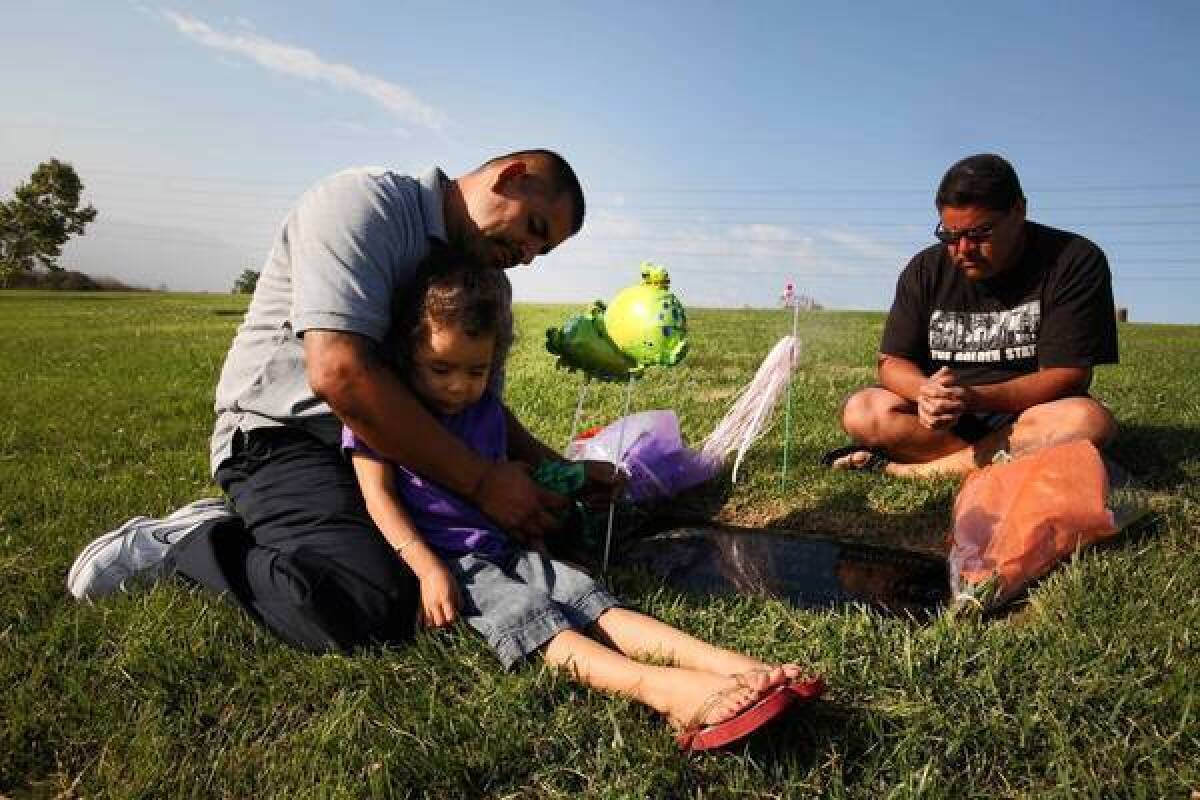Ruling on juvenile killers reopens wounds for victims’ families

WASHINGTON — Jose Vasquez remembers the night police officers came to his house and said his sister Tayde was dead. He remembers too the mornings escorting his mother to the trial in Long Beach, and their relief when the young killer was given life in prison with no parole.
Now, after 20 years, the Supreme Court has ruled that juvenile murderers with mandatory life sentences should have a chance at parole, a decision that has led many states to debate comparable legislation.
On Thursday, the California Assembly passed a measure that someday could set free youthful offenders like Elizabeth Lozano, who was 16 when 13-year-old Tayde Vasquez was shot in the head.
For Tayde’s family, that is like the knock at the door again. Preparing to fight back, they returned to the courthouse this summer, collecting old records and transcripts, and seeking out prosecutors. They also have written prison officials asking to be told whether Lozano files a legal appeal, wins a parole hearing, escapes or dies. They are determined to keep her inside the California state prison in Chowchilla.
“It’s like it’s all coming back again,” Vasquez said. “It’s like a ghost hunting us down.”
His sister Sarah Vasquez said that just the thought of Lozano enjoying family visits in prison bothered them. “If we want to visit my sister,” she said, “we have to go to a cemetery and talk to a stone.”
In the United States, about 2,000 inmates are serving life with no parole for juvenile murder. In California, there are 300 such offenders. To get parole under the bill, likely to pass next week in the state Senate, they would first have to serve 25 years and then convince authorities that they regretted their past actions, have stayed out of trouble in prison and could be productive in society.
That is a very high bar. Yet Lozano, now 37, has by all appearances turned her life around. She has excelled in academics, led prison fellowships and won accolades from the prison administration.
For the Vasquez family, that is not good enough. Nor does it persuade victims’ advocates like Maggie Elvey, whose husband was killed in 1993 by two youths in San Diego County. She said opponents would consider a lawsuit to stop enforcement if the bill became law.
“You do it, that’s it,” she said of a life sentence. “That’s what you get.”
Jennifer Bishop-Jenkins, whose pregnant sister and her husband were killed in 1990 by a 17-year-old in the Chicago suburb of Winnetka, worried that the court ruling would be emotionally devastating for her if she had to once more fight against a killer’s release. After so many years, she said, case files might be missing, memories may have faded and witnesses long ago may have died.
“Everything we would need to arm ourselves might be lost,” she said. “Our ability to fight a parole hearing would be severely compromised.”
Some states have found ways to get around the court’s ruling. In Iowa, Republican Gov. Terry Branstad last month commuted sentences of life with no parole for all 38 juvenile murderers in his state, but he then made them eligible for parole only after they served 60 years. A killer at age 15 would be 75 before he saw a parole board.
In the Long Beach slaying, Lozano’s fate is similar to that of others convicted in juvenile cases in California. Judges were not required to give the harsh sentences but did so because of the heinous nature of the crimes.
Tayde Vasquez was shot in the head and robbed of jewelry in 1992 at the DeForest Park nature trail. At the time, Lozano was a runaway in and out of local gangs, and Tayde the pampered baby of her family, a shy girl with dark eyes and bangs who kept her home phone number in her pocket. That is what brought police to the Vasquez door.
Jose Vasquez, an unemployed computer technician in El Monte, remembered how the slaying was “rough, really, really rough” on his mother. For a while, he said, “she lost her mind. She just grieved, and it was really sad.”
Lozano moved to Mexico and was arrested after returning to Southern California. At her 1996 trial, Lozano, a young mother by then, asked Judge Richard Romero to “please have mercy on me.” She told him: “I’m just sorry for Tayde. She was very young and just a little girl.”
Tayde’s mother addressed the judge too. “Elizabeth Lozano deprived the life of my child and sent her to a cemetery forever,” Laura Vasquez said. “Now in the name of that girl I ask her to be committed to prison for the rest of her life.”
The judge called the killing “quite vicious and callous,” and though he acknowledged Lozano was “quite young” herself, he noted that “the victim was particularly vulnerable.”
Lozano went to prison for life, and the Vasquez family often visits the cemetery. Once they watched as Tayde was reburied because of water problems at her grave site in Whittier. Just like the thought of Lozano being free again, said Sarah Vasquez, a Phoenix waitress, that too was difficult to handle.
“Elizabeth Lozano,” she said, “doesn’t know the meaning of suffering.”
More to Read
Sign up for Essential California
The most important California stories and recommendations in your inbox every morning.
You may occasionally receive promotional content from the Los Angeles Times.











